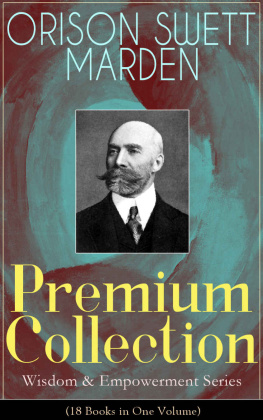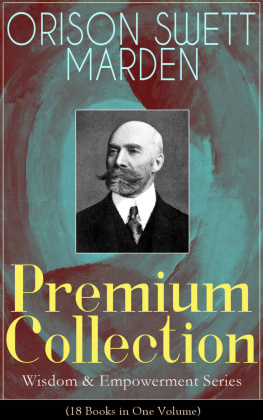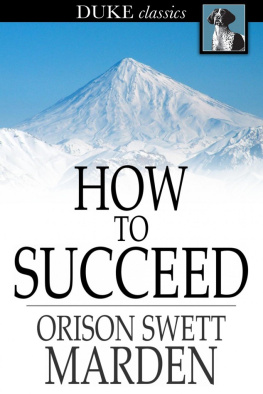ARCHITECTS OF FATE
OR, STEPS TO SUCCESS AND POWER
* * *
ORISON SWETT MARDEN
*
Architects of Fate
Or, Steps to Success and Power
From an 1897 edition
ISBN 978-1-62011-406-3
Duke Classics
2012 Duke Classics and its licensors. All rights reserved.
While every effort has been used to ensure the accuracy and reliability of the information contained in this edition, Duke Classics does not assume liability or responsibility for any errors or omissions in this book. Duke Classics does not accept responsibility for loss suffered as a result of reliance upon the accuracy or currency of information contained in this book.
Contents
*
*
A BOOK DESIGNED TO INSPIRE YOUTH TO CHARACTER BUILDING, SELF-CULTURE AND NOBLE ACHIEVEMENT
"All are architects of fate
Working in these walls of time."
"Our to-days and yesterdays
Are the blocks with which we build."
"Let thy great deed be thy prayer to thy God."
Preface
*
The demand for more than a dozen editions of "Pushing to the Front"during its first year and its universally favorable reception, both athome and abroad, have encouraged the author to publish this companionvolume of somewhat similar scope and purpose. The two books wereprepared simultaneously, and the story of the first, given in itspreface, applies equally well to this.
Inspiration to character-building and worthy achievement is the keynoteof the present volume, its object, to arouse to honorable exertionyouth who are drifting without aim, to awaken dormant ambitions inthose who have grown discouraged in the struggle for success, toencourage and stimulate to higher resolve those who are setting out tomake their own way, with perhaps neither friendship nor capital otherthan a determination to get on in the world.
Nothing is so fascinating to a youth with high purpose, life, andenergy throbbing in his young blood as stories of men and women whohave brought great things to pass. Though these themes are as old asthe human race, yet they are ever new, and more interesting to theyoung than any fiction. The cry of youth is for life! more life! Nodidactic or dogmatic teaching, however brilliant, will capture atwentieth-century boy, keyed up to the highest pitch by the pressure ofan intense civilization. The romance of achievement underdifficulties, of obscure beginnings and triumphant ends; the story ofhow great men started, their struggles, their long waitings, amid wantand woe, the obstacles overcome, the final triumphs; examples, whichexplode excuses, of men who have seized common situations and made themgreat, of those of average capacity who have succeeded by the use ofordinary means, by dint of indomitable will and inflexible purpose:these will most inspire the ambitious youth. The author teaches thatthere are bread and success for every youth under the American flag whohas the grit to seize his chance and work his way to his own loaf; thatthe barriers are not yet erected which declare to aspiring talent,"Thus far and no farther"; that the most forbidding circumstancescannot repress a longing for knowledge, a yearning for growth; thatpoverty, humble birth, loss of limbs or even eyesight, have not beenable to bar the progress of men with grit; that poverty has rocked thecradle of the giants who have wrung civilization from barbarism, andhave led the world up from savagery to the Gladstones, the Lincolns,and the Grants.
The book shows that it is the man with one unwavering aim who cuts hisway through opposition and forges to the front; that in this electricage, where everything is pusher or pushed, he who would succeed musthold his ground and push hard; that what are stumbling-blocks anddefeats to the weak and vacillating, are but stepping-stones andvictories to the strong and determined. The author teaches that everygerm of goodness will at last struggle into bloom and fruitage, andthat true success follows every right step. He has tried to touch thehigher springs of the youth's aspiration; to lead him to high ideals;to teach him that there is something nobler in an occupation thanmerely living-getting or money-getting; that a man may make millionsand be a failure still; to caution youth not to allow the maxims of alow prudence, dinned daily into his ears in this money-getting age, torepress the longings for a higher life; that the hand can never safelyreach higher than does the heart.
The author's aim has been largely through concrete illustrations whichhave pith, point, and purpose, to be more suggestive than dogmatic, ina style more practical than elegant, more helpful than ornate, morepertinent than novel.
The author wishes to acknowledge valuable assistance from Mr. Arthur W.Brown, of W. Kingston, R. I.
O. S. M.
43 BOWDOIN ST., BOSTON, MASS.
December 2, 1896.
Chapter I - WantedA Man
*
"Wanted; men:
Not systems fit and wise,
Not faiths with rigid eyes,
Not wealth in mountain piles,
Not power with gracious smiles,
Not even the potent pen:
Wanted; men."
Run ye to and fro through the streets of Jerusalem, and see now, andknow, and seek in the broad places thereof, if ye can find aman.JEREMIAH.
All the world cries, Where is the man who will save us? We want a man!Don't look so far for this man. You have him at hand. This man,itis you, it is I, it is each one of us!... How to constitute one'sself a man? Nothing harder, if one knows not how to will it; nothingeasier, if one wills it.ALEXANDRE DUMAS.
"'Tis life, not death for which we pant!
'Tis life, whereof our nerves are scant:
More life and fuller, that we want."
I do not wish in attempting to paint a man to describe an air-fed,unimpassioned, impossible ghost. My eyes and ears are revolted by anyneglect of the physical facts, the limitations of man.EMERSON.
But nature, with a matchless hand, sends forth her nobly born,
And laughs the paltry attributes of wealth and rank to scorn;
She moulds with care a spirit rare, half human, half divine,
And cries exulting, "Who can make a gentleman like mine?"
ELIZA COOK.
"In a thousand cups of life," says Emerson, "only one is the rightmixture. The fine adjustment of the existing elements, where thewell-mixed man is born with eyes not too dull, nor too good, with fireenough and earth enough, capable of receiving impressions from allthings, and not too susceptible, then no gift need be bestowed on him.He brings his fortune with him."
Diogenes sought with a lantern at noontide in ancient Athens for aperfectly honest man, and sought in vain. In the market place he oncecried aloud, "Hear me, O men;" and, when a crowd collected around him,he said scornfully: "I called for men, not pygmies."
The world has a standing advertisement over the door of everyprofession, every occupation, every calling; "WantedA Man."
Wanted, a man who will not lose his individuality in a crowd, a man whohas the courage of his convictions, who is not afraid to say "No,"though all the world say "Yes."
Wanted, a man who, though he is dominated by a mighty purpose, will notpermit one great faculty to dwarf, cripple, warp, or mutilate hismanhood; who will not allow the over-development of one facility tostunt or paralyze his other faculties.
Wanted, a man who is larger than his calling, who considers it a lowestimate of his occupation to value it merely as a means of getting aliving. Wanted, a man who sees self-development, education andculture, discipline and drill, character and manhood, in his occupation.












